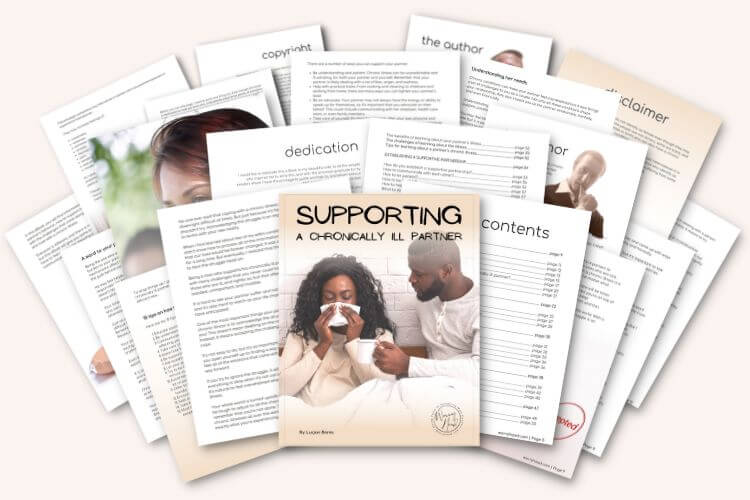Why nobody takes male partners of chronically ill women seriously?
Men of chronically ill women.
Men of chronically ill women aren’t often taken seriously because the majority of caregivers are women. In our society, it is simply assumed that women are the ones who care for the sick and elderly. This assumption is not only sexist, but it can also be harmful to those who do not fit into this stereotype, and this is why nobody takes male partners of chronically ill women seriously…
Men who are the caregivers of chronically ill women often feel invisible and unappreciated. They may feel like they are not being taken seriously. This can be very frustrating and isolating. Men are just as capable of caring for their sick partners as women are.
If you are a man who is caring for a chronically ill woman, you may feel totally alone and like nobody understands what you are going through, and there are many other men in your situation.
I know that because many times I was made to feel that way, and even though it never seemed to be intentional, I felt like my role as a caregiver was not valued as much as my female counterparts.
One of the main reasons why nobody takes male partners of chronically ill women seriously is because our society still views caregiving as a woman’s job. But being a caregiver for young disabled adults with complex needs, I found many men working along my side.
And even though my wife suffers from multimorbidity, she is pretty independent. Does it mean I am not her caregiver?
Mixed identity…
I always wondered if being a husband I was automatically a spousal caregiver because I never considered myself my wife’s carer. I help her, I go to her doctor’s and hospital appointments, I also make sure she takes care of herself, and I even research her conditions.
She is independent and can do everything herself. Only when she has bad flare-ups I support her the best I can. I don’t consider myself my wife’s carer, I’m her husband. A caregiver is someone who provides care for another person, often on a full-time basis. It includes providing medical care, helping with daily tasks, or offering emotional support.
By profession, I am a caregiver to disabled young adults with complex needs such as cerebral palsy, so I can clearly distinguish between being a carer and a partner.
If you want to learn how to cope with your partner’s chronic illness, how to support her struggles, and manage a relationship with a chronic condition, I give away a FREE Chapter of my eBook: “Supporting a Chronically Ill Partner”.
This chapter alone has all the comprehensive information about acknowledging the struggles, including:
- A word to your partner.
- A word to you.
- Stepping on eggshells.
- Understanding her needs.
- How to acknowledge having a chronically ill partner?
- Acknowledging can be hard.
- 15 tips on how to do it!
Get the 1st Chapter FREE!
Chronic Illness for Partners

What do men of chronically ill women feel?
It can be difficult for men to see their partners suffer from a chronic illness. They often feel helpless and are left wondering why nobody takes their pain and suffering seriously.
It’s not uncommon for men to feel like their role is to care for their ill partner and provide support, but they can often feel neglected and unappreciated. This can be a difficult situation to manage, but it’s important to remember that your partner is going through a tough time and needs your support.
If you’re feeling overwhelmed, talk to your partner about what you’re going through and look for ways to help out around the house or with doctor’s appointments. It’s also important to take care of yourself and make sure you’re getting enough rest and relaxation.
Self-care is important, especially for men who are caregivers for chronically ill women. It can be easy to forget about your own needs when you’re focused on caring for someone else, but it’s important to make sure you’re taking care of yourself, too.
Make sure to schedule some time for yourself each day, even if it’s just a few minutes. Take a break from your caregiving duties to relax, read, or take a walk. And if you’re feeling particularly stressed, don’t hesitate to reach out to a friend or family member for support.
Caring for a chronically ill woman can be a difficult and thankless task, but it’s important to remember that your role as a caregiver is vital. You are the one who knows your partner best and can provide the support and care she needs.
What’s going through our minds?
We sacrifice a part of ourselves – our time, our hobbies, our goals.
We put our lives on hold to take care of our sick partners, often without any recognition or appreciation.
We feel guilty when we can’t do more, and we feel guilty when we’re not doing enough. We worry about the future and what will happen if our partner’s health deteriorates further. We feel isolated and alone because nobody really understands what we’re going through.
We just want our partners to get better, and we want our lives back. But we are men, and nobody takes us seriously.
Why is that? Is it because we’re seen as the strong, silent type? The ones who are supposed to be able to handle anything? Or is it because our partners’ illness is seen as a “woman’s issue”?
Whatever the reason, it doesn’t change the fact that we’re in this situation too. We care for our partners just like they care for us. We feel the same pain, the same frustration, and the same worries.
So why don’t people take us seriously?
Maybe it’s because they don’t see us as caregivers. They see us as the strong, silent type who can handle anything. But the truth is, we’re human too. We have feelings and we need support just like our partners do.
Maybe it’s because our partners’ illness is seen as a “woman’s issue.” But the fact is, men can be affected by chronic illness just as much as women can. We need to be able to talk about our experiences and get the support we need.
Whatever the reason, we’re here to say that we’re more than just the silent type. We’re caregivers, we’re supporters, and we need to be taken seriously.
Our feelings need to be validated. The problem is, that men don’t open up easily. So it might take a little bit of effort to get us talking. But once we do, you’ll see that we have just as much to say as our partners do.
We need to be able to express ourselves, and we need to know that we’re not alone in this and show people why nobody takes male partners of chronically ill women seriously. So this is why I started this blog, to give a voice to male partners of women who suffer from chronic conditions.

How do I cope?
My wife has two chronic illnesses. The first one is endometriosis, the second one is fibromyalgia. On top of that, my wife suffers from anxiety, OCD, and depression. All of the above impact one another in a vicious cycle of stress and illness.
Yes, she suffers tremendously, but I am also affected. Maybe I don’t experience panic attacks, anxiety, or depression, but I go through a number of feelings I never experienced before my wife’s diagnosis.
As her husband, I feel like I need to be strong all the time. But sometimes, I just can’t be…
Sometimes, I need to take a break. And even though I don’t take time off when she needs me, I find time for myself each day, even if it’s just a few minutes. I take a break from my caring duties.
I’m a fitness fanatic, I used to spend a few hours at the gym on a daily basis, no fail. On top of that, being a dancer, I used to dance with my wife a few times a week. Today, we bearly hit the floor, and because I feel the need of being close to my wife, I gave up on the gym. I work out with weights at home, but it’s not the same vibe.
So what do I do? How do I cope?
I blog.
Blogging is the best thing that ever happened to me. Not only do I help gazillions of people, but I also get paid for it! As time goes by, blogging will become my full-time job, and it is a passive kind of income everybody dreams of.
Blogging allows me to research information for myself and my ill wife but also allows me to share what I feel. Expressing emotions comes difficult to men, so blogging helps me tremendously! It’s a form of writing therapy.
But how can other men cope?
Coping strategies for men!
Below, I listed plenty of coping strategies for men who care for their chronically ill women. Here are 15 of them:
- Get involved in their partner’s treatment: learn about the illness, what can be done to manage it, what the triggers are, etc.
- Communicate with their partner: talk about how you’re feeling, what your worries are, etc.
- Seek social support: talk to friends, and family, or join a support group for caregivers.
- Take care of their own health: eat well, exercise, get enough sleep, etc.
- Find time for themselves: hobbies, interests, friends, etc.
- Seek professional help if needed: therapy, counseling, etc.
- Be patient: accept that there will be good days and bad days.
- Accept help from others: family, friends, community resources, etc.
- Take one day at a time: don’t try to do too much at once.
- Give themselves credit: acknowledge their own efforts and accomplishments.
- Set boundaries: know their limits and stick to them.
- Seek respite care if needed: short-term breaks from caregiving duties to recharge.
- Make time for intimacy: physical and emotional closeness is important in any relationship.
- Plan ahead: anticipate needs and put contingency plans in place.
- Take a break: vacations, weekends away, etc. to rejuvenate.
No matter what coping strategy men choose, the most important thing is to do what works for them. There is no right or wrong way to cope with the challenges of being a caregiver. What matters is that men find a way to care for themselves as well as their ill partner.
Despite the reasons why nobody takes male partners of chronically ill women seriously, I want you to know that you are doing an amazing and selfless thing. Your partner is lucky to have you!


About Me
Hi, I’m Lucjan! The reason why I decided to create this blog was my beautiful wife, who experienced a lot of pain in life, but also the lack of information about endometriosis and fibromyalgia for men…
